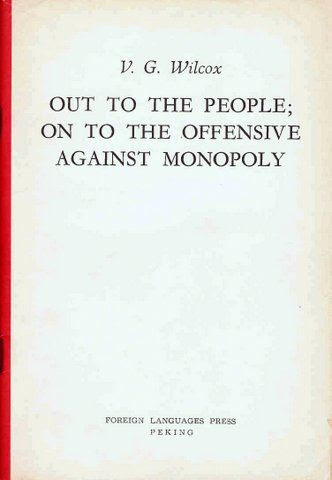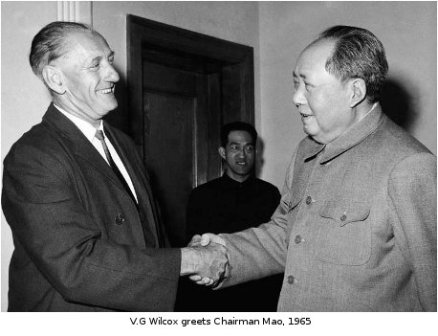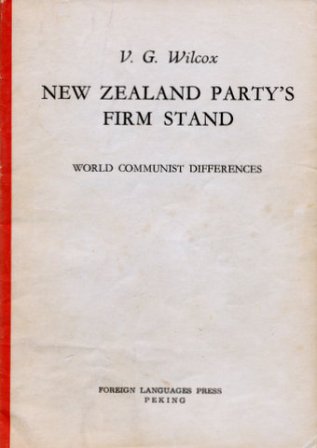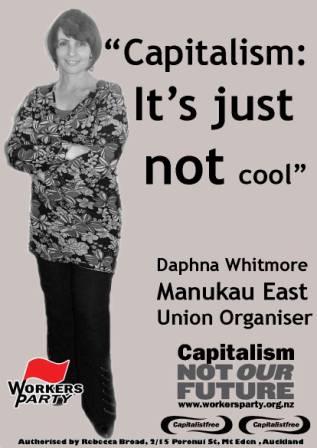Founded in December 1920, the Communist Party of New Zealand (CPNZ) was unique among communist parties in the developed world in that it closely aligning itself with China and Albania and their polemics against “modern revisionism,” in 1963-64.

In fact, only one of the eight member Political Committee and three members of the 21 National Committee sided with the Soviet Union in this Sino-Soviet dispute. These pro-Soviet elements (mainly Auckland trade unionists) under the leadership of former CPNZ chairman George Jackson were the backbone of a Party split that led to the formation of the pro-Soviet Socialist Unity Party in 1966. Alexander Drennan became its inaugural president, and remained its ’elder statesman’ until his death in November 1971.
Although weakened by the split, and particularly by the loss of much of its trade union base, the CPNZ for about a decade and a half, continued to maintain a solid pro-China position. CPNZ leaders made frequent visits to China and its ally, Albania during these years. In March 1966, Party General Secretary V.G. Wilcox spent ten days in China. In that same year, two other party leaders, R. Nunes and A. Rhodes, attended the Fifth Congress of the Albanian Workers Party. Even at the height of China’s diplomatic isolation, CPNZ leading members and delegations visited China on numerous occasions in 1967. References to the CPNZ in the official Chinese media only began to lessen in 1973, reflecting the change in China’s foreign policy priorities.
The CPNZ produced the weekly ’Peoples Voice’ newspaper, and the theoretical monthly, ’New Zealand Communist Review’. Chinese publications were a staple at the Party’s left wing book shop, Progressive Books in Derby Street off Queen Street Auckland.
Beginning in first half of the 1970s, the CPNZ was wracked by a series of expulsions, suspensions and resignations. In the latter half of the1970s, inner party disputes led to the formulation of a host of new organisations and groupings which reflected the debates within the international communist movement and mirrored its own growing fragmentation. In particular, the fall of the Gang of Four and the split between China and Albania had major impacts on anti-revisionism in New Zealand.
After the fall of the Gang of Four, the CPNZ leadership, supported by ten of the twelve branches of the CPNZ, rejected the policies of the post-Mao China leadership, in particular the “theory of three worlds” and came out in support of the line of the Party of Labour of Albania. As a result, Wilcox, the CPNZ General Secretary, who had continued to support the Chinese line, was expelled.
However, the CPNZ leadership was thrown into confusion when Enver Hoxha began attacking the Marxist credentials of Mao Zedong. In August 1979 a CPNZ delegation led by Ray Nunes went to Albania to discuss ideological differences. After its return, the Political Committee adopted a pro-Mao resolution. The appearance of an article, “What Mao Really said,” in the November 1979 edition of the ’New Zealand Communist Review’, whilst attacking the current ’Chinese revisionists’, contained a veiled critique of the Albanian characterisation of Mao Zedong as a lifelong revisionist. By February 1980, however, the CPNZ Central Committee endorsed the Albanian analysis that the victory in China in 1949 was a bourgeois democratic revolution and Mao was not a Marxist-Leninist. Pro-Mao elements, who had been in the CPNZ delegation to Albania in August 1979, Ray Nunes and Nat Gould and others – including the entire Wellington branch – left the CPNZ.
The New Zealand anti-revisionist individuals and groups that rejected the CPNZ and its Pro-Albania line were themselves badly divided. They included:
* Former members of the CPNZ national leadership, including V. G. Wilcox, Alec Ostler and Don Ross. They formed the Preparatory Committee for the Formation of the Communist Party of New Zealand (Marxist-Leninist) in May 1978. The Committee supported the post-Mao China leadership. In February 1980 the Preparatory Committee merged with the like-minded “Struggle” group, an earlier split from the CPNZ from 1976. In 1988 the group changed its name to the Organisation for Marxist Unity.
* Former members of the CPNZ in Wellington, where the party branch had been expelled en masse in 1970. They founded, along with New Left radical students, and ex-CPNZ members (Ron Smith) the Wellington Marxist Leninist Organisation, which in 1980 merged with the Northern Communist Organisation to form the Workers Communist League (WCL). Later the WCL absorbed the small Marxist-Leninist Workers Party.
* The Red Flag Group, organised around Nat and Flora Gould in 1980. This group declared its support for the Maoism of the ’Gang of Four’ and was one of the signatories to the ’Declaration of the Revolutionary Internationalist Movement’ in March 1984.

All of these groups were small and had extremely limited influence. By the 1990s the New Zealand anti-revisionist movement was in serious decline.
After the collapse of Communism in Albania, the CPNZ gradually changed its views. Under the leadership of its last General Secretary, Grant Morgan, it developed a “state capitalist” analysis of the socialist countries. The remnants of the CPNZ eventually merged in 1994 with the International Socialist Organization based in the politics of the Trotskyist International Socialism tradition. The resultant party called itself the Socialist Workers Organization.
Opponents of this change left the CPNZ, giving rise to two politically opposed organisations: the Communist Party of Aotearoa (a Maoist group using the native Mori name for New Zealand); and a pro-Hoxha group, the Marxist-Leninist Collective (Communist Party of New Zealand Reconstruction Collective) that existed until about 1997.
Ray Nunes, formerly a prominent member of the CPNZ, was instrumental in the founding of the Workers’ Party of New Zealand (WPNZ) in 1991. It published ’The Spark’ and described itself as “pro-Mao, Marxism-Leninism”. In February 2011 a minority section of the former leadership of the WPNZ, including former National Secretary Daphna Whitmore, former National Organiser Philip Ferguson and former ’Spark’ Co-ordinating Editor Don Franks announced their decision to leave the organisation. In June 2011 these individuals joined with other former members of the Workers’ Party to launch an on-line publication entitled ’Redline’.
Organizational Chart of New Zealand Anti-Revisionism
New Zealand and China by Rewi Alley [Eastern Horizon, Vol. 11, No. 2, 1972]
New Zealand-China Relations: Common Points and Differences by Anne-Marie Brady
’Telling the Truth About People’s China’ by Alistair Shaw
Report from New Zealand by Harry Holland
The Communist Party of New Zealand, 1921-1981
How the CPNZ Was Hijacked by a group of veteran Communists
N.Z. International Socialists fuse with Stalinist C.P.N.Z.
Wilcox, Victor George, 1912–1989
Obituary: Rex Chell Holliss, August 26th 1926-March 3rd 2000
Obituary: Mollie Ostler 1918-2000
Out To the People; On To the Offensive Against Monopoly by V. G. Wilcox
Joint Statement of the Communist Party of China and the Communist Party of New Zealand
Speech at the Higher Party School of the Central Committee of the Chinese Communist Party by V. G. Wilcox
Resolutions of the National Committee of the C.P. of New Zealand [Peking Review, #49, December 6, 1963]
V. G. Wilcox: The Leadership of the C.P.S.U. Have Taken the Revisionist Path [Peking Review, #52, December 27, 1963]

New Zealand Party’s Firm Stand by V. G. Wilcox
V. G. Wilcox’s Speech at Party School in Canton [Peking Review, #12, March 20, 1964]
Ideology and Methods of Work [from Vanguard, published by the U.K. Committee to Defeat Revisionism For Communist Unity, Vol. 1, No. 9, October 1964]
M. H. Williams on Meeting of Communist and Worker’s Parties [Peking Review, #19, May 8, 1964]
Joint Statement of the Communist Parties of New Zealand and Indonesia [Peking Review, #25, June 19, 1964]
New Zealand CP Opposes Early World Meeting of Parties Without Adequate Preparations [Peking Review, #35, August 28, 1964]
New Zealand CP. on March Moscow Meeting [Peking Review, #15, April 9, 1965]
Statement on the March Moscow Meeting Adopted by the Political Committee of the Communist Party of New Zealand
The “Unity” Advocated by Modern Revisionists Means Split [Peking Review, #21, May 21, 1965]
Wilcox Denounces Modern Revisionists for Undermining National Liberation Movement [Peking Review, #33, August 13, 1965]
Public Polemics Help the Return of the Movement To Marxist-Leninist Position Says V.G. Wilcox, General Secretary of the Communist Party of New Zealand [Peking Review, #42, October 15, 1965]
Combat Imperialism and Revisionism. Joint Statement of New Zealand C.P. and Australian C.P. (M-L) [Peking Review, #51, December 16, 1965]
New Zealand CP. Turns Down C.P.S.U.’s Invitation [Peking Review, #15, April 8, 1966]
C.P.C. Central Committee Greets 21st National Conference of C.P.N.Z. [Peking Review, #16, April 15, 1966]
The Communist Party of New Zealand on Revisionism by V. G. Wilcox
Resolutions of the 21st National Conference of C.P.N.Z. [New Zealand Communist Review, May 1966]
V. G. Wilcox Greets the 45th Anniversary of the Founding of the Communist Party of China: Mao Tse-tung’s Thought is a Compass for All People Aspiring to Change the World [Peking Review, #33, August 12, 1966]
China’s Cultural Revolution is in the Interests of the People of the World by V.G. Wilcox [Peking Review, #39, September 23, 1966]
Marxist-Leninists Can Never Talk About Unity With Revisionists by V.G. Wilcox [Peking Review, #42, October 14, 1966]
Comrade Kang Sheng Greets Comrade Nunes [Peking Review, #49, December 2, 1966]
Comrade Mao Meets Comrade Wilcox [Peking Review, #12, March 17, 1967]
Comrade Wilcox Leaves for Home After Visiting Kwangchow [Peking Review, #13, March 24, 1967]
Soviet Revisionists' Slander Cannot Harm the Great China by V. G, Wilcox [Peking Review, #40, September 29, 1967]
Chairman Mao Is Great Marxist-Leninist Leader Of the Era by R. Nunes [Peking Review, #46, November 10, 1967]
Comrade V.G. Wilcox in Peking [Peking Review, #12, March 22, 1968]
Study Chairman Mao’s New Contribution On Dialectics by V.G. Wilcox [Peking Review, #30, July 26, 1968]
New Zealand Communist Party Statement [On Soviet intervention in Czechoslovakia] [Peking Review, #35, August 30, 1968]

Give Priority to the Study of Mao Tse-tung’s Thought [Peking Review, #43, October 25, 1968]
Statement by Political Committee of the Communist Party of New Zealand [on the Cultural Revolution] [Peking Review, #49, December 6, 1968]
Comrades Chou En-lai and Kang Sheng Hold Talks With New Zealand C.P. Delegation [Peking Review, #4, January 24, 1968]
Comrade V.G. Wilcox Calls On All Members of Communist Party of New Zealand to Study Chairman Mao’s Works [Peking Review, #31, August 1, 1969]
Comrade V.G. Wilcox and Ron Taylor Visit China [Peking Review, #17, April 24, 1970]
“N.Z. Communist Review” Calls for Study of Chairman Mao’s Solemn Statement [Peking Review, #33, August 14, 1970]
Trotskyism by Nat Gould
The Struggle of Two Lines – The Law of Development and Unity of the Party [New Zealand Communist Review, May 1973]
More on the Struggle of Two Lines [New Zealand Communist Review, July 1973]
One Divides into Two – More on the Struggles of Two Lines [New Zealand Communist Review, August 1973]
Facts Convict the McAra-Wright Conspiratorial Anti-Party Group [New Zealand Communist Review, January-February 1975]
McAra's Line is Line of Class Collaboration [New Zealand Communist Review, March 1975]
Liberalism Blunts Two Line Struggle [New Zealand Communist Review, July 1975]
Grasp More Firmly the Banner of Marxism-Leninism, Lead-in Statement to the National Secretariat, CPNZ, to a Recent Plenum of the National Committee[New Zealand Communist Review, October 1975]
Summary of the National Committee Plenum [New Zealand Communist Review, October 1975]
Letter From General Secretary Wilcox of Communist Party Of New Zealand [on the death of Mao] [Peking Review, #40, September 30, 1976]
Communist Party of New Zealand reaffirms basic line and policy
Communist Party of New Zealand’s United Stand on Major World Questions
Communist Party of New Zealand’s Firm Stand Against the New Revisionism Full Text of the Report Adopted at an Extended Plenum of the National Committee, Communist Party of N.Z., September 2nd and 3rd, 1978
New Chinese Leaders Paving Way to Shelve Mao to Justify Their Policies
“Carry the Struggle Against Revisionism Through to the End“
New Zealand Communists on Revolutionary Strategy [International Forum, #3, February 1981]
C.P.N.Z. Joins Revisionist Ranks Statement issued by Marxist-Leninist groups in Auckland and Wellington, New Zealand
Mass Protest Stops Springboks’ Game in New Zealand
Report to the 23rd National Conference, C.P.N.Z. April 21-22, 1984
CPNZ Condemns Chinese Fascism: Statement on massacre of students and workers in Tiananmen Square
[Back to top]
When the Chinese Communist Party began actively promoting the theory of three worlds, the Communist Party of New Zealand declined to follow suit. Supporters of the new line within the CPNZ leadership, including V. G. Wilcox, Alec Ostler and Don Ross, were forced out of the Party. In May 1978 they announced the formation of a Preparatory Committee for the Formation of a Communist Party of New Zealand (Marxist-Leninist). The group published a newspaper called Advance.
The Preparatory Committee stressed its support for the three worlds theory and for cooperation with the Communist Party of Australia (ML). The following month, in Auckland, an enlarged initial meeting of the committee was held but it decided to postpone the setting up of a new party until the group gained wider support. In February 1980 the Preparatory Committee merged with the like-minded “Struggle” group, an earlier split from the CPNZ from 1976. Struggle thereafter became the theoretical journal of the group.
Delegates from the Preparatory Committee visited China in March 1980 at the invitation of the Chinese Communist Party. On its return the delegation concluded that ’China is the bulwark against world reaction and is in the forefront of building socialism... Those who do not recognise this cannot today be regarded as Marxists’.
In 1988, the Preparatory Committee changed its name to the Organisation for Marxist Unity.
China is NOT Selling Out SOCIALISM!
[Back to top]
In 1988 the Preparatory Committee for the Formation of a Communist Party of New Zealand (Marxist-Leninist) changed its name to the Organisation for Marxist Unity (OMU), and ceased production of their monthly newspaper Advance while continuing to publish the quarterly magazine Struggle.
The name change reflected a lessoning of the group’s former uncritical reliance on the Chinese model of revolution as did the new masthead of Struggle which now read, ’A Marxist approach to New Zealand problems – especially the need to break the domination of the multinationals’. Although there was no mention of Mao Zedong Thought in the writings of the OMU, it still retained a theory of revolution by states and an unstated commitment to the Theory of the Three Worlds. Members of the OMU were active in a variety of mass campaigns and organizations including the group Campaign Against Foreign Control of Aotearoa (CAFCA).
The extent of OMU’s continuing support of China was demonstrated during the events in Tiananmen square in 1989. Initially, Struggle characterized the students demonstrating in the square as representing ’socialist democracy in action.’ However, after the government crackdown, Struggle published a ’Summary of Chinese accounts of Tiananmen’ and excerpts of an interview with Han Suyin declaring that ’we cannot have judgment by media’. OMU’s effort to both support and maintain a certain distance from China was demonstrated in another Struggle article, which stated, ’As for our own work in New Zealand, its thrust is for political achievements in New Zealand. Whatever may happen in a socialist country will not divert us from that. But the recent events in China should not be allowed to be used against socialism and as propaganda for capitalism.’
After the founding of the Communist Party of Aotearoa (CPA) in 1993, it undertook merger negotiations with the OMU. Although a merger was never finalized, in 2002 the CPA suspended production of its paper Red Flag in favour of promoting the OMU journal Struggle.
Long-standing New Zealand revolutionary dies
[Back to top]
In 1970 the Wellington branch of the CPNZ was expelled en masse. Under Rona Bailey it focused its work on Wellington’s Victoria University. Before long it had supporters on a number of campuses where it was involved in actions against apartheid and the Vietnam war and for Maori Land Rights and Women’s liberation. It was also active in the New Zealand-China Friendship Society, helping to sponsor visits of student activists to China.
In 1976 this group formalised itself as the Wellington Marxist-Leninist Organisation. In 1980 it joined with the Auckland/Hamilton based Northern Communist Organisation and several university based groups to form the Maoist Worker’s Communist League (WCL). It has been suggested that the name came from the Canadian Worker’s Communist Party (WCP) “with which the Workers Communist League maintained links and acknowledged inspiration”. Its publication was called Unity.
The WCL established other international relationships including with League for Revolutionary Struggle in the United States and with communist parties in Norway, Peru and the Philippines.
In the 1980s the WCL continued to be active in anti-apartheid work as well as solidarity campaigns with revolutionary movements in Central America and Asia.
In the late 1980s the WCL also moved away from its former Maoism to the point that it held “formal talks of an exploratory nature” with the Socialist Action League (SAL), the country’s principal Trotskyist organization, in order “to create a socialist alliance of the ’ecumenical left’. Nothing came of this effort. Thereafter, the WCL went even further, abandoning Marxism-Leninism and arguing that “much of the communist movement today [is] itself irrelevant to struggles for liberation”. At its 7th National Conference in January 1990 it dissolved itself into a short-lived formation called Left Currents.
How Socialist Extremists Took Over the New Zealand Labour Party Part 4: The Maoists [on the WCL]
Liquidationism Destroys the Workers’ Communist League! from International Review
[Back to top]
The Red Flag Group was organised by Nat and Flora Gould in 1980 in support of the Maoist politics of the Cultural Revolution and the ’Gang of Four’. It was one of the signatories to the DECLARATION OF THE REVOLUTIONARY INTERNATIONALIST MOVEMENT in March 1984, organized by the U.S. Revolutionary Communist Party. The Red Flag Group publishing a magazine of the same name between 1980-1991. It faded from the scene in the mid-1990s after the death of its leader Nat Gould.
Comments on Basic Principles by by a comrade from the Red Flag Group [from A World To Win, 1982]
New Zealand: Trouble on Queen St. Letter from the Red Flag Group [from A World To Win, 1985]
On the Life of Comrade Nat Gould Statement by the Committee of the Revolutionary Internationalist Movement
[Back to top]
The Workers’ Party of New Zealand (WPNZ) was founded in 1991 by Ray Nunes, formerly a prominent leader in the Communist Party of New Zealand, who left the organization when it endorsed the Albanian critique of Mao Zedong. The WPNZ described itself as “pro-Mao, Marxism-Leninism”. The WPNZ believed that Mao’s contribution was flawed but invaluable, hence, ’pro-Mao’, however it did not place more emphasis on him than on Marx and Lenin, hence ’Marxism-Leninism’.
Nunes remained a leading figure in the group, authoring many papers and pamphlets which the Party published along with a journal called The Spark. His pamphlets included analysis on the collapse of the Soviet Union and one on the “Restoration of Capitalism in China” (included in the pamphlet collection From Marx to Mao – and After). His essay The Maori in Prehistory and Today (1999), which is believed to be the first Marxist analysis of the Maori national question.
In 2002 the WPNZ joined with a South Island-based Trotskyist group, Revolution, as well as some independent leftists to stand in the parliamentary elections held that year as the Anti-Capitalist Alliance (ACA). The Anti-Capitalist Alliance produced a publication, Liberation.
In 2004, the WPNZ and the Revolution group renamed themselves the Revolutionary Workers’ League, but in 2006 took back the old Workers’ Party of New Zealand name.
Anti-Capitalism or Stalinism in Nepal? by the Communist Workers Group
Time for a Real Anti-Capitalist Alliance by the Communist Workers Group
Terrorism in perspective. Its relation to the state and the class struggle from a Marxist viewpoint
Overcoming Theoretical Chaos: Problems of building a new World Communist Movement
The Maoiri in Prehistory and Today
Politics and Ideology. Meetings with Kang Sheng, 1966-1968
Marxism-Leninism or Eclecticism
Stalin – A Balanced Assessment
Programme of the Workers’ Party of New Zealand

Armed Struggle and the Third World. The Growth of People’s War by Ray Nunes and Daphna Whitmore
A Marxist-Leninist of extraordinary calibre: Ray Nunes
Working class hero and fighter to the end by Daphna Whitmore [obituary for Jock Barnes]
Why Trotskyism abhors revolution by Daphna Whitmore
New Zealand: imperialist or semi-colony?
Constitution of the Workers Party of New Zealand
The need for Workers Party struggle against Trade Union politics by Don Franks
The Truth About Labour: A bosses’ party by Daphna Whitmore and Philip Ferguson
A Marxist Guide to Understanding Economics by Tim Bowron
Open Letter from Workers Party (NZ) to Socialist Aotearoa Comrades
Second Open Letter to Socialist Aotearoa
2011 Resignations from the Workers Party
Report: Workers Party Summer Conference 2013
What the Workers Party Stands For
All Things Bright and Beautiful
Anti-Capitalist Alliance to stand in general election
Anti-Capitalists launch campaign in Wellington
The Anti-Capitalist Election Campaign
Anti-Capitalists standing in 8 electorates
The Spark, #213, February 2008
The Spark, #233, March 2010
The Spark, #237, July 2010
[Back to top]
The Revolutionary Workers League (RWL) was created in 2004 out of a merger of the Workers’ Party of New Zealand and the pro-Trotsky Revolution group based at the University of Canterbury, both of which were active in the Anti-Capitalist Alliance (ACA), an electoral coalition created with the intention of fielding candidates in the 2002 New Zealand general election.
At its formation, the RWL took over the running of the two publications of its predecessor organisations (The Spark and Revolution.) In 2006, when the ACA rebranded itself as the (post-regroupment) Workers Party of New Zealand, the RWL ceased to exist.
Fusion forms new group–Revolutionary Workers League
Left unity in New Zealand by Phil Duncan
The Spark, #200, September 12, 2006
[Back to top]
The Communist Party of Aotearoa (CPA) was formed in 1993 as a split from the Communist Party of New Zealand (CPNZ), which, after the collapse of Communism in Albania, abandoned Maoist anti-revisionism and developed a State Capitalist analysis of the former socialist countries. (Aotearoa is now the most widely known and accepted Maori name for New Zealand). After its founding, the CPA began merger negotiations with another Maoist split from the old CPNZ, the Organisation for Marxist Unity (OMU). Although a merger was never finalized, after 2002 the CPA suspended production of its paper Red Flag in favour of promoting the OMU journal Struggle. The CPA appears to have become inactive in 2006-2007.
Towards A Socialist Peoples Republic of Aotearoa. Programme of the Communist Party of Aotearoa (NZ)
Constitution of the Communist Party of Aotearoa
Red Flag, August 1997
Red Flag, May 1998
Revolutionary Struggle Transformed by the Recolonisation of Aotearoa Central Committee Statement, 1 August 1998
Red Flag, February 1999
Red Flag, May 1999
Marxism and the Labour Movement
A New Agenda: Electoral Programme of the Communist Party of Aotearoa [2002]
[Back to top]
At a Workers Party conference held in January 2013 the delegates voted to change the organization’s name to Fightback. The decision was made because it was felt that the name “Workers Party” was not appropriate given that the organization was not a mass workers party. Fightback, on the other hand, was seen as better reflecting the group’s goal of building a fighting propaganda group: “an organisation whose chief concern is propaganda, but which conducts its propaganda while always immersing itself in and responding to the class struggle, and while always seizing every real opening for genuine agitation.“
Report: Workers Party Summer Conference 2013
Fightback’s Pre-History in the New Zealand Left by Daphne Lawless
[Back to top]